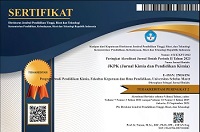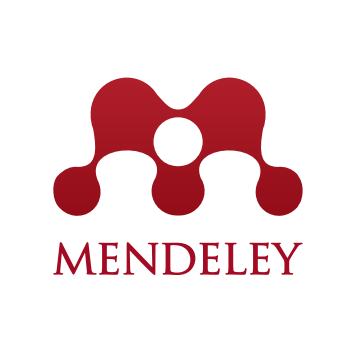The Implementation of Problem-Solving Model Using Concept Mapping Strategy to Increase Students’ Interest and Learning Achievement at the Lintas-Minat Chemistry Class
Abstract
This Classroom Action Research (CAR) aims to improve students’ interest and achievement in learning in the eleventh grade students of lintas-minat Chemistry 1 of SMA Negeri 2 Surakarta in academic year 2015/2016 by implementing the learning model of problem-solving using mapping concept strategy in buffer solution subject matter. This CAR was carried out in two cycles and in each cycle there was four stages consisting of action planning, action implementation, observation, and reflection. Data of interest aspect and attitude aspect of learning achievement were collected through observations, questionnaires, and interviews techniques. Data of knowledge aspect and skill aspect of learning achievement were collected using test and observation techniques, respectively. The research data were analyzed using qualitative descriptive technique. The results of this research can be concluded that the implementation of problem-solving learning model using concept mapping strategy can increase the eleventh grade students’ interest and achievement in the learning subject matter of buffer-solution at the Lintas-Minat Chemistry 1 class of SMA Negeri 2 Surakarta. The achievement percentage of students’ interest aspect in the first cycle is 55% and the second cycle increases to 80%. The learning achievement of knowledge aspects increases from 60% in cycle I to 80% in the second cycle. The learning achievement of attitude aspect (spirituality, honesty, responsibility, and cooperation) reached 100% in cycle I with unfinished cooperation indicator and 100% in cycle II with completed of cooperation attitude indicator. For learning achievement in skill aspect in cycle I has reached 100%.
Keywords
Full Text:
PDFReferences
Peraturan Menteri Pendidikan Nasional, Undang – Undang Republik Indonesia Nomor 20 Tahun 2003 Tentang Sistem Pendidikan Nasional. Jakarta: Kemendiknas, 2003
Peraturan Menteri Pendidikan dan Kebudayaan, Salinan Lampiran Peraturan Menteri Pendidikan dan Kebudayaan Nomor 69 Tahun 2013. Jakarta: Kemendikbud, 2013.
Slameto, Belajar dan Faktor-faktor yang Mempengaruhinya. Jakarta: Rineka Cipta, 2010.
Marsita, R. A.,et al., Jurnal Inovasi Pendidikan Kimia, 4(1), 512-520, 2010.
Sanjaya, W., Strategi Pembelajaran Berorientasi Standar Proses Pendidikan. Jakarta: Prenada Media, 2006.
Hamdani, Strategi Belajar Mengajar. Bandung: Pustaka Setia, 2011.
Fischer, A., & Neubert, J. C. Jurnal of Dynamic Decision Making, 1(6), 1-13. doi: 10.11588/jddm.2015.1.23945., 2015.
Warsono & Hariyanto, Pembelajaran Aktif. Bandung: Remaja Posdakarya, 2013.
Dahar, R. W., Teori-Teori Belajar dan Pembelajaran. Jakarta: Erlangga, 2011.
Suyono & Hariyanto, Belajar dan Pembelajaran. Bandung: Remaja Posdakarya, 2014.
Tripto, J., Assaraf, O. B., & Amit, M., American Journal of Operation Reasearch, 3, 245-258. doi: 10.4236/ajor.2013.31A022, 2013.
Gregory, R.J., Psychology Testing History, Principle, and Aplications (7th Ed). England: Pearson Education Ltd., 2015.
Miles, M. B. dan Huberman, A.M., Analisis Data Kualitatif. Bandung: Alfabeta, 1995.
Moleong, L. J., Metodologi Penelitian Kualitatif. Bandung: PT Remaja Rosdakarya, 2009.
Refbacks
- There are currently no refbacks.








